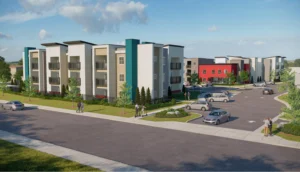
The February 16 town hall was a “Presentation of Background, Development and Project elements related to the Northstar Courts Multifamily Housing Project” according to the agenda. Developing firm UPholdings, with Self Help Enterprises as an advisor, plans to build the $24 million housing project. Construction is projected to begin June 2022 and be completed by November 2023.
With more than 700 people packed into the Hanford Civic Auditorium, the residents let city officials and the developers know in no uncertain terms that the Northstar Courts project violated community standards for safety and parking.
People commented during the meeting they were afraid of being attacked by a mentally ill person having a breakdown.
The housing project will be located at 664 and 682 Northstar Drive, on land east of CVS and the Chevron Station which are in the Fargo Crossings Shopping Center at 11th Avenue and Fargo Avenue.
The evening was punctuated by boos, applause, protest signs against the project, and verbal threats to recall Mayor Diane Sharp and City Manager Mario Cifuentez. At times the meeting had more of the feel of a mob action than a civic gathering. Police were there to keep order.
“This is a train wreck ready to happen,” said Mike Spicer, a retired law enforcement officer. Spicer said the project would create traffic problems. He did a comprehensive crime analysis of the region and said North Hanford is like Mayberry insinuating that the housing project will bring in crime.
He then directed his comments to city council members and said, “What did you know, when did you know it and what did you do?”
One of the themes of the three-hour special city council meeting was poor communication about the existence and purpose of the project. Also the project did not have to be approved by the city planning commission, or the city council, because as a Neighborhood Mixed Use project the complex is a permitted use, said Cifuentez.
When Cifuentez said there was “no attempt to hide anything” his statement was greeted by shouts of “no” and boos. However, he conceded that the city could have done a better job of communicating with residents about the project which will also have 33 apartments for current or retired farm workers and 16 units for working families.
Hanford, the Central Valley and the state are experiencing a crisis in affordable housing. Cifuentez said Hanford needed 15,695 additional housing units.
“Most of the people don’t want the project,” said Gordon Jester. “(The) mayor said (it’s) done deal. I don’t put up with tyrannical governments.”
Others such as Rene Estee said putting the project behind Loew’s or behind Chile’s would be a better choice.
“I can’t believe the way this was slipped in. This was crap. Put up a tent village (for the homeless),” she said.
One unidentified male speaker said, “I don’t care how it sounds. You guys aren’t welcome here at all.”
Kings County Supervisor Joe Neves told the Voice that the supervisors are open to considering other locations for the project.
And while less than a handful of those present said they supported helping the homeless and other lower income residents, the majority of the audience didn’t accept their sentiment judging by the reception given the speakers.
This is a reputable company that has built thousands of units for working families, said Susan Long, of Self-Help Enterprise, the developer.
“It’s not a handout, it’s a hand-up,” she said. “Everyone in here at one point is there (needing help),” Long said. The audience wouldn’t let her finish her defense of the project.
Another speaker said, “this town hall meeting was hijacked by the city council. The city council, board of supervisors disappointed us. You are not going to LA our Hanford,” he said.
Jessica Hoff Berzac of Upholdings said during a question and answer session that while the project location can’t be changed because of financial commitments from the state and federal government, the developer Self-Help Enterprises will work with the community to address their concerns.
As Berzac started to speak about two-thirds of the audience left.
Although some speakers said the county paid multi-millions for the $24 million project, the actual county contribution, which came from behavioral health funds, was $1 million, said Berzac. The bulk of the money, she said, came from the state and some funds were provided by the federal government.
The facility will have 102 parking spaces which will be regulated, she said. The parking, Berzac said, was designed in consultation with city engineers. The facility, she said, will not be used for emergency shelter.
It doesn’t make a person violent because she can afford a $1,000 a month apartment instead of $1,800 one, Berzac said. The facility will have a $500,000 security system with a camera on every corner, she said. In addition, there will be a live-in onsite manager.
